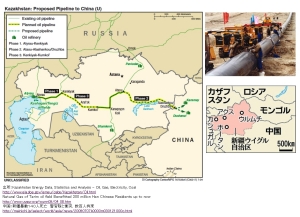ウイグル暴動とオイル&ガス・コネクション ― 2009/07/06 23:11
<関連記事引用>
Xinjiang unrest: The oil and gas connection
July 6, 2009 12:05pm by Kate Mackenzie
http://blogs.ft.com/energy-source/2009/07/06/xinjiang-unrest-the-oil-and-gas-connection/
Xinjiang in western China is a province rich in natural resources - a fact not unconnected with the unrest in which 140 people have died in the past few days. The region’s oil and gas riches have been a growing source of tension between the province’s original Uighur residents and the mostly Han migrants from the east, who now make up the majority of the population.
Last year the FT’s Jamil Anderlini visited the region and described the desert surrounding the city “punctuated every kilometre or two by oil and gas derricks, each of them topped with the red Chinese national flag, an assertion of sovereignty over every inch of the energy-rich ground”.
One resident described how the state’s attitude to cultural and religious freedom changed with the oil boom:
“The Chinese didn’t want to let Xinjiang be independent before, but after they built all the oilfields, it became absolutely impossible,” said one Muslim resident in Korla, who asked not to be named for fear of retribution by government security agents.
Xinjiang is the site of an important junction in a pipeline running through Kazakhstan, where Chinese oil companies own stakes in several oil producers, and which has just been extended to reach the Caspian Sea.
Xianjing also contains China’s biggest natural gas reserves, and a 4,000km gas pipeline connects Xianjing to Shanghai.
It’s not just energy: migrants have also moved there to work on large state-owned farms that make the province China’s biggest producer of cotton and tomatoes. Conflict has arisen over land rights, water rights (cotton is a thirsty crop) and the distribution of jobs between Han and Uighur. While some of the original residents have benefited from the economic boom that has taken place there, the latest violence shows that has not been enough to smooth relations between the groups.
Xinjiang oil boom fuels Uighur resentment (FT, 28/08/2008)
http://www.ft.com/cms/s/0/163dec1c-7518-11dd-ab30-0000779fd18c.html?nclick_check=1
Separatism stirs on China’s forgotten frontier (FT, 17/08/2008)
http://www.ft.com/cms/s/0/26082e82-6c7b-11dd-96dc-0000779fd18c.html
July 6, 2009 12:05pm in Politics | Comment
【ウイグル暴動】独立派を支える民族感情 不安定な状態継続は不可避
2009.7.6 19:33
http://sankei.jp.msn.com/world/china/090706/chn0907061934008-n1.htm
【北京=伊藤正】中国新疆ウイグル自治区の区都ウルムチで6日発生した大規模な暴動は、漢族の「支配」に対するウイグル族など少数民族の根深い反感を背景にしており、チベット問題同様、少数民族政策が中国政府のアキレス腱(けん)であることを改めて示した。中国は、今回の暴動を分離独立派の策謀とし、その弾圧に一層力を注ぐ構えだが、民族対立が激化し不安定な情勢が続くのは不可避とみられている。
中国当局の発表では、今回の事件は、広東省で6月末に発生した漢族とウイグル族の衝突をめぐり、在外のウイグル人組織「世界ウイグル会議」が「決起」を扇動したためだという。昨年3月のチベット騒乱と同じく、漢族支配への抗議が大流血事件に発展したのは、少数民族側の反漢族感情の強さを物語る。
新疆地区は、特に1990年代以降、交通インフラの建設が進み、年平均10%超の経済成長を遂げた。全国の3割前後の埋蔵量を占める天然ガス、石油をはじめ地下資源の開発ラッシュが起こったが、その関連産業などを含め、経済ブームを担い巨大な利益を手にしたのは漢族企業である。
むろん少数民族住民も経済発展の恩恵に浴したものの、ウイグル族学者らによると、自治区経済の9割は漢族が支配、ウイグル族ら少数民族の言語、文化、宗教も破壊されているという。チベットでは漢族は6%にすぎないが、新疆では40%を超え、ウルムチでは漢族が最多になった。
こうした状況は、漢族を、資源を略奪し環境を破壊、民族滅亡を図っていると非難する分離独立運動が、当局の弾圧にもかかわらず生き続ける理由になっている。
中国政府がチベットと併せ新疆の分離独立を容赦しないのは、経済的理由以上に戦略的な価値による。従って、今回の事件を機に、中国政府は、分離独立派の壊滅に躍起になるはずだ。
中国は今回、「国際的陰謀」と宣伝、強気の姿勢にでている。事情はどうあれ約1千人もの死傷者をだして国際社会の批判など気にしていないポーズを取るのには理由がある。中国は新疆の分離独立派の後背地である中央アジア諸国を上海協力機構に抱き込み、反テロの共同戦線を張るのに成功した。2001年9月の米中枢同時テロ後は、米国に協調する形で独立派組織を徹底的につぶしてきた。
人権問題に敏感な米欧が、特に金融危機以後、対中依存を深めていることも、中国に有利な環境にある。しかし新疆の独立派支持派を抹殺できないことも否定できないだろう。
<画像引用サイト>
Kazakhstan Energy Data, Statistics and Analysis - Oil, Gas, Electricity, Coal
http://www.eia.doe.gov/emeu/cabs/Kazakhstan/Oil.html
Natural Gas of Tarim oil field Benefitted 300 million Han Chinese Residents up to now
http://www.uygur.org/wunn09/04_08.htm
中国:新疆暴動140人死亡 警官隊と衝突、数百人拘束
http://mainichi.jp/select/world/asia/news/20090707k0000m030121000c.html
コメント
トラックバック
このエントリのトラックバックURL: http://y-sonoda.asablo.jp/blog/2009/07/06/4416611/tb
※なお、送られたトラックバックはブログの管理者が確認するまで公開されません。


コメントをどうぞ
※メールアドレスとURLの入力は必須ではありません。 入力されたメールアドレスは記事に反映されず、ブログの管理者のみが参照できます。
※投稿には管理者が設定した質問に答える必要があります。